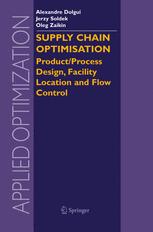

Most ebook files are in PDF format, so you can easily read them using various software such as Foxit Reader or directly on the Google Chrome browser.
Some ebook files are released by publishers in other formats such as .awz, .mobi, .epub, .fb2, etc. You may need to install specific software to read these formats on mobile/PC, such as Calibre.
Please read the tutorial at this link: https://ebookbell.com/faq
We offer FREE conversion to the popular formats you request; however, this may take some time. Therefore, right after payment, please email us, and we will try to provide the service as quickly as possible.
For some exceptional file formats or broken links (if any), please refrain from opening any disputes. Instead, email us first, and we will try to assist within a maximum of 6 hours.
EbookBell Team

4.7
26 reviewsThis volume is a collection of recent key results in supply chain optimisation. It presents new approaches and methods based on operations research, artificial intelligence and computer sciences techniques for design of production systems, supply and inventory management, production planning and scheduling, facility location, transportation and logistics, supply flow optimisation via simulation, etc. The content focuses on a wide spectrum of optimisation problems taking into account supply chain paradigms, which create a pivotal idea to increase the productivity of modern production systems.
The first part of the book presents a set of modelling techniques taking into account the enterprise integration problem, the knowledge management in the SME networks, and the human resources in business process engineering. The second part is dedicated to advanced optimisation methods for supply chain design and management which are based on mathematical programming and metaheuristics. The third part of this book deals with some examples of advanced applied decision aid tools directly linked to real industrial problems.
Audience
This volume is suitable for industrial engineers, faculty staff and graduate students in industrial engineering, management science, operations research, artificial intelligence and computer sciences. This book can be used as a reference for graduate courses and also for researchers and industrial engineers to capture current trends in this field.